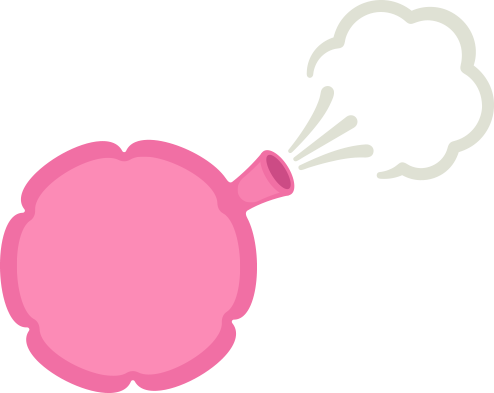Bloating and Flatulence
Bloating and flatulence occur when there is too much air in the intestines. The body can get rid of this excess gas in different ways. You can read about who is affected and the possibilities for diagnosis and treatment here.
Contents
What is bloating?
Meteorism (meteoros – Greek for “floating in the air”) is when the stomach is distended (“bloated“) and bulging.
Flatulence is when intestinal gases are released through the anus. In most cases, flatulence is harmless and only temporary. Consuming certain foods, eating too hastily, but also food intolerances and even stress can trigger flatulence.

What are the symptoms of bloating?
Depending on the cause, bloating can be accompanied by other symptoms:
- Diarrhoea
- Abdominal pain and cramps
- Constipation
- Feeling full
What causes bloating?
Bloating is caused by an imbalance of the natural intestinal flora (nowadays called intestinal microbiota). More gas-forming intestinal bacteria settle there. The most common causes include poor eating habits – hasty eating leads to more air being swallowed, which then enters the digestive tract.
The majority of intestinal air is produced by the intestine or the bacteria in the intestine during the metabolic processes themselves. This process is enhanced by certain foods (e.g. high-fibre foods such as cabbage, cabbage, legumes and onions). Very rich, fatty or sweet foods, as well as excessive alcohol or coffee consumption, can also have a flatulent effect. Sugar substitutes used in many diet, light and sugar-free products (e.g. sorbitol and xylitol) also produce excess gas.
Flatulence is also a typical symptom of irritable bowel syndrome. Psychological factors such as stress or anxiety, hormones (e.g. during pregnancy or at the beginning of menstruation) can also promote gas in the intestines. In addition, various other health conditions can be accompanied by flatulence.

Find the cause of your bloating problems
- What medication are you taking or have you taken recently?
- Do you have any other health conditions?
- Do you also have complaints in the area of the liver, gall bladder and/or pancreas?
- Do you have any other symptoms apart from bloating?
- When, after which foods or drinks and how often do you get bloated?
- Are you often in a rush when you are eating?
- Are you stressed?
Colic in Babies
What are the symptoms of colic and how do these attacks of pain differ from normal crying episodes? Plus, what can I do to help my baby?
What can you do to help with bloating?
Depending on the cause of the bloating, attempts can be made to treat the underlying condition or to avoid the triggers. Since boating is annoying but usually harmless, “gentle” measures should also be used for treatment. Artichoke leaves, fennel, peppermint oil, caraway, anise, papaya and ginger – as tea or herbal medicines – contain bitter substances and stimulate the digestive system.
Natural intestinal bacteria – probiotic bacterial preparations – are recommended by medical-scientific guidelines for the treatment of flatulence, which is common among irritable bowel patients. These probiotic intestinal bacteria not only eliminate the symptoms (including bloating), but also the causes of irritable bowel syndrome and restore the balance in the intestine in three ways.
Probiotics for Bloating
- Intestinal bacteria are completely natural microorganisms that occur in the healthy intestine and support our digestion and well-being in many ways.
- Intestinal bacteria have no unwanted effects – occasionally, at the beginning of the treatment, you may experience slight flatulence and stool changes. However, this is temporary before the beneficial effects begin.
- With intestinal bacteria (including bifidobacteria, lactobacilli, lactococci, streptococci) – which are combined in special compositions against the various causes – inflammation, “leaky gut“, harmful germs (often after taking antibiotics or intestinal infections), motility disorders – one gets to the bottom of the causes of the complaints and eliminates them.
Feeling bloated again? Is your stomach already painfully bloated even after only a small meal? Find out here where this phenomenon comes from and what really helps!
Top tips to help bloating
Tip 1:
Optimise your regular daily rhythm: getting up, going to bed, meals, and sports activities should take place at a similar time each day. Any restlessness, or any disruption of your normal routine (e.g. shift work, long-distance travel) will upset the balanced digestive rhythm.
Tip 2:
Have food intolerances diagnosed! Tests for intolerances (e.g. lactose intolerance test) can confirm a suspicion but do not rule out an intolerance in every case if the result is negative.
Tip 3:
Eliminate flatulent, hard-to-digest foods from the diet! This requires creating a food diary and finding out the foods, drinks and situations that influence the symptoms and cause discomfort. Prevention is better than cure. Many small portions are better than a few large ones! Eat slowly and chew well! Drink enough (e.g. non-carbonated mineral water)! Avoid fatty and flatulent foods as well as very cold and very hot drinks!
Tip 4:
Smoking should be given up if possible and alcohol should only be consumed in moderation!
Tip 5:
A colon cleanse can help! Bentonite and humic acids have a high binding capacity for toxins and waste products and can therefore also “neutralise” and remove intestinal gases. Psyllium husks and special probiotics or synbiotics regulate bowel movements, soothe and regenerate the intestinal mucosa and restore healthy intestinal flora.
Tip 6:
A (also long-term) intake of probiotic multispecies synbiotics that protect the intestinal mucosa and balance the digestive function is ideal for prophylaxis and supportive treatment of flatulence (also in the context of irritable bowel syndrome).
Tip 7:
Support your liver! With foods that are rich in bases, but also with bitter substances, the increased flatulence that occurs with liver weakness can be prevented. A permeable intestine (“leaky gut“) can be “sealed” in a mild way through the use of natural intestinal bacteria, which not only combat the symptoms but also eliminate the causes, the intestinal mucosa is regenerated and the intestinal barrier protection is rebuilt.
Tip 8:
Consider effective stress management! No organ reacts as sensitively to stress as the intestine, so bloating can be caused by excitement and stress.













